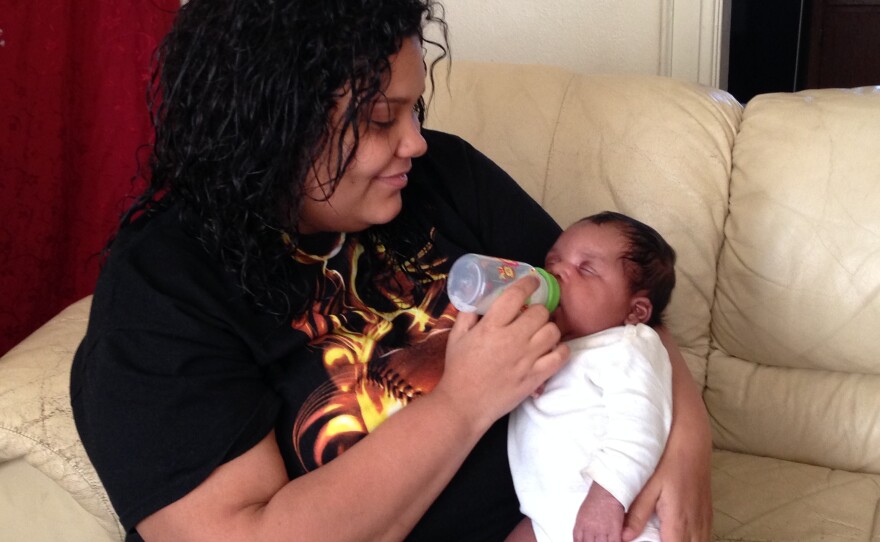
Nate May's Prius is loaded down with water. The back is filled with boxes, each holding three one-gallon jugs that he just bought at Walmart. He and other volunteers are driving around Charleston, W.V., dropping off the jugs to people who have contacted his ad hoc group, the West Virginia Clean Water Hub. It's paid for with donations.
"There are a lot of people this has put in a difficult bind. Some of them can't get out, some of them are elderly, some of them -- it's just too much of a financial burden," May says. "We just take them at their word if they say they need water."
More than a month has passed since a chemical leak polluted Charleston's water supply, and life is anything but normal for the 300,000 or so people in the area. Many are still relying on bottled water to drink and others have gone to lengths to avoid using the water at all. They're feeling an economic pinch and are upset with government officials.
One of May's first stops this morning is the second floor apartment of Nakeysha Bennett, whose baby is 3-week-old Eli.
"I was actually in the middle of eating dinner and drinking water when we turned on the news and they were like, 'Don't drink the water,'" Bennett says. "I was pregnant and so I started freaking out."
Her doctors told her to drink bottled water, so she uses bottled water for his formula. "That's kind of hard to do because we went through cases and cases and cases of water," she says.
Bennett says she has no idea how long she'll have to fix Eli's formula and bathe him with bottled water. And she's pretty fed up.
"I feel like there are a lot of people who aren't doing their jobs or something," she says. "It is so hard. I can't live like this with bottle water. It drives me crazy that I can't just use regular water out of my sink."
Maya Nye of People Concerned About Chemical Safety says this leak might have an impact in a way that previous accidents in more isolated areas of West Virginia have not. Charleston is the state's population center, the center of government. And there are lawyers and lobbyists and people who know how to raise their voices.
"I do believe it's a tipping point," Nye says. "I mean, 300,000 people, you hit them on sort of a basic human survival level ... it's hard not to respond.
West Virginia's members of Congress have called for laws to make sure that tanks like the one that leaked, owned by Freedom Industries, and for more oversight of the state's many other chemical facilities. But University of Charleston professor Brad Deel isn't optimistic about changing the state's lax regulation of the coal and chemical industry.
"What I predict will happen is that people will make a lot of noise. There will be some minor, minor regulations passed," Deel says. "To the extent that anything major is proposed, people will say, 'Let's not be too hasty, let's not make any rash changes.' Industry will open its wallets and its lobbying organizations to the politicians and very little will happen."
Meanwhile, in St. Albans, just outside Charleston's water system, Joanne Kirby and her three lively kids are having a pizza picnic. Kirby lives in Charleston, where she and three other families have rented a small apartment in St. Albans so they could bathe the kids and wash their clothes in clean water.
The families keep track of whose turn it is to use the place on a Google calendar. Kirby, a lawyer, says their family doesn't use the water at home at all.
"One day my daughter was brushing her teeth, and she turned on the faucet by mistake and wet her toothbrush and then just dropped it -- and then burst into tears," she says. "You know, that's not a great feeling as a parent. You're doing your best to keep a routine and keep calm, but the kids pick up on the tension. They're aware."
Richard Katz is another lawyer whose family shares the unfurnished apartment. "It's worked out great so far," he says. "Unfortunately it looks like we're going to have to have the place for another month at least."
Katz and the other families know they are fortunate to have the means to escape Charleston's water. But Katz says unless it's resolved soon, the water crisis may make some escape the area for good.
"If there is no meaningful change there will be a brain drain here," he says. "Not only will people leave, but attracting young people and talent to the area will be extremely difficult."
Before the families leave the apartment, they turn on the faucet and fill some jugs to take home.
Copyright 2014 NPR. To see more, visit www.npr.org.






